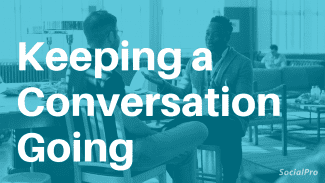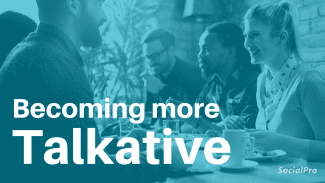I was often the quiet person, especially in groups or with new people. I used to think there was something wrong with me. In reality, being “the quiet one” is super common for introverts, shy people, or those of us who just don’t feel the urge to talk that much.
This guide is about how to be less quiet at work, in school, or in groups in general. I’ll show how you can go from being the quiet one to be able to talk more and take up space when you want.
What we’ll go through:
- How to be less quiet
- Overcoming the underlying reasons you might be quiet
- How to not be quiet in groups
- Overcoming being quiet in the long-term
1. Lower your standards for what’s important to say
“I really don’t know how to engage in the conversation. When everyone else is laughing and making jokes, I have no idea what to say. They can talk endlessly, I can’t.”
If you’re more on the anxious side, you probably overestimate how much people judge/care about what you say. If you analyze socially savvy people, you’ll notice that they don’t worry about what to say. They can say obvious things, and no one judges them for it.
Know that socializing is not really about exchanging valuable information. It’s more about having an enjoyable time together. Practice saying things even if they aren’t super clever, important, or valuable.
2. Practice letting your thoughts out
Practice saying everything that’s on your mind as long as it’s not rude or ignorant. This can help you decide what to say and what not to say.
As long as something isn’t rude, it’s good enough to say. It can be time-consuming to always think about if something might be rude. A simpler rule to start with can be “don’t be negative about someone or something”. If you keep it positive, it’s generally safe to say.
3. Know that it’s OK to take time to respond
“I just felt like before I had time to think and understand what was happening, someone else was replying with a relevant or witty comment. It is just frustrating because I feel like I am slow and incompetent.”
Taking time to come up with things to say is common and has nothing to do with intelligence. If anything, my personal experience is that smart people are more careful and take more time wording their sentences.
Instead of responding with something witty, respond with a spontaneous reaction:
- If someone said something you thought was funny, laugh to show that you appreciate the joke rather than trying to come up with something smart to respond.
- If someone said something interesting, ask them more about it rather than trying to respond with something as interesting.
4. Make remarks about thoughts and surroundings
Socially savvy people make simple remarks. They know that it’s a good way to spark new conversations. The remark doesn’t have to be clever. Even the most obvious remark can inspire a new conversation topic.
You: “Wow, cool architecture”.
Your friend: “Yeah, it looks European. (Now it’s natural to start talking about architecture, Europe, design, etc.)
Make simple remarks and notice how it can ignite interesting conversations.
5. Ask questions when you don’t know something
Ask questions when you don’t know.
If someone says “I’m an Ontologist”, don’t say “Uh… okay” and worry that you’ll come off as stupid for not knowing what it is. Dare to be curious. “What is an ontologist?”
People appreciate it when you ask genuine questions. It leads to more interesting conversations and you signal that you care about them.
6. Focus on the conversation rather than on you
Focus your attention on the conversation, just like when you focus on a good movie. When you do, you stop worrying about yourself and how you come across. That makes you less self-conscious.
Focusing all our attention on something tends to make us more curious about it.[5] That makes it easier to come up with questions that move the conversation forward. “How does that work?,” “What was it like?,” etc.
Every time you notice that you end up in your own head, force your attention and curiosity back to the conversation.
7. Elaborate when you answer questions
Avoid answering questions with only a yes or no. If someone asks you a question, it’s often because they want to make contact and see if you are interested in talking to them.
If someone asks you how your weekend was, instead of saying “good,” share a little about what you did. “It was good. I took a long walk on Sunday and just enjoyed the summer. What were you up to?”
8. Share about yourself
It’s a myth that people only want to talk about themselves. They also want to know who they are talking to: It’s uncomfortable to open up to someone you don’t know anything about.
Make it a habit to share a little bit about yourself in between your questions.
- If someone tells you about their job, share what you do.
- If someone talks about what music they like, share what music you like.
- If someone talks about where they’re from, let them know where you are from.
The key is to share roughly an equal amount of information. If someone summarizes their job in a few sentences, you should do the same. If someone explains what they do in detail, you can go more in detail, too.
Before you share about yourself, show genuine curiosity in what they say:
9. Be genuinely curious and ask to understand
Conversations are usually more rewarding when we delve into someone’s experience before we share our own experiences.
If someone visited Spain, first ask about their experience to understand what it was like. Then, after you’ve shown genuine interest in their story, you can share one of your related experiences.
10. Cultivate an interest in people
See each new person as a map with blanks. It’s your job to figure out those blanks. Where are they from? What do they like doing in life? What are their dreams and thoughts? What are their opinions and feelings about what you talk about?
You can cultivate an interest in people just like you can cultivate an interest in art, poetry or wine. This interest can help you be more curious which makes it easier to make conversation.
11. Remind yourself that you don’t need to be clever
I thought that I had to come up with clever things to say to not be judged. In reality, you don’t need to be smart or witty at all. In fact, trying to be smart or witty can make you overthink and tense up.
When you censor and inhibit yourself, that makes the conversation flow less smoothly and can even damage your relationship long-term.[10]
Pay attention to the way socially savvy people make conversation. You’ll notice that often, they make obvious statements or bring up a very simple conversation topic. Some of those might evolve into more interesting topics. But don’t be afraid to start simple.
12. Signal that you’re friendly
Being quiet isn’t weird in itself. It only gets weird if people worry that you don’t like them or that you’re in a bad mood. By signaling that you’re friendly, you’ll remove that worry. As a result, people will understand that you’re just a naturally quiet person.
Here are some ways to show friendliness:
- A relaxed smile rather than a tense face
- Making eye contact rather than looking down
- Asking an occasional question that shows that you care, like “How have you been since last time?”
Our guide on how to be more friendly.
13. See occasional silences as something positive
Silence can give people time to reflect and make the conversation more thoughtful and interesting. Don’t see it as a failure if there are silences at times. These silences are only awkward if you make them awkward.
Read our guide on how to be comfortable with silence.
1. Know that being quiet is not a defect, it’s a personality trait
I believed that there was something wrong with me because I wasn’t talkative. In fact, being quiet has more to do with personality and the amount of training we’ve had.
Knowing that there’s nothing wrong with you can help realize that you’re not “doomed”. You can learn to be great at taking up space if you want to.
- If you, like me, are a natural introvert, I’d recommend my guide on how to be more extroverted (when you need/want to be).
- If you’re naturally shy, you might want to read our guide on how to stop being shy.
2. Correct unrealistic and negative thought patterns
Be aware of your self-talk. Sometimes, our inner voice says things like:
- People will think that I’m stupid.
- No one cares about what I think.
- They will laugh at me.
- They will stare at me and it will be awkward.
Listen carefully to what your voice says. If it says that you are stupid, is there proof of the opposite? Have you experienced times where you talked and people did not seem to think you were stupid?
Correct your inner voice every time it talks down on you. This helps you get a more realistic view of yourself. “It feels like they will laugh at me, but they didn’t last time, so it’s unrealistic that they would now”.
3. Know that you need to feel some discomfort to improve
See social discomfort as something good. After all, it’s a sign that you do something outside of your comfort zone. Every minute you feel uncomfortable and nervous, you grow a little bit as a person.
Don’t see nervousness and discomfort as a stop sign. See it as a growth sign. If talking more makes you uncomfortable, it’s a sign you should continue. It means that you are growing as a person.
4. See a therapist
A therapist can help you work through underlying issues for why you might be quiet. While books and other self-help often can be helpful, a therapist can guide you through the process and give you an outside perspective.
It’s common to be reserved in groups because the energy level is often higher and it’s harder to make your voice heard. These tips have helped me to be more talkative in groups.
1. Make simple, small contributions
Say small things to contribute to the group conversation. That’s enough to signal that you’re friendly and interested in participating. If you’re completely silent, people might assume that you are in a bad mood or that you don’t like them.
It can be something as simple as…
“Yeah, I’ve heard of that, too.”
“That’s interesting, I didn’t know that”
“Haha that’s funny”
2. Show that you listen and the group will see you as part of the conversation even when you don’t say much
Give signals that you listen closely in group conversations and people will include you even if you don’t say much. React like you would react when someone talked to you 1 on 1:
- Look at the speaker even if they at first don’t look at you.
- Make listening sounds like “hmm”, “ah” etc.
- When suitable, laugh or make exclamations like “cool”, or “what!”.
Try this, and notice how the speaker suddenly starts looking at you when talking. You become part of the conversation.
Some feel like they don’t have the “right” to take for granted that the speaker wants to talk to them. See it as making the speaker a favor: You’ll make them happy by rewarding them with your attention.
3. Talk on instinct
Group conversations are instant. Like you grab a ball suddenly coming toward you without thinking about how to best react. The same thing with group conversations – you should aim to respond on instinct. Just catch the ball.
We all have the ability to talk on instinct. As a safety behavior, we sometimes stop responding on instinct. We try to minimize the risk of saying the wrong thing.
Like I talked about in the previous chapter of this guide, practice saying anything as long as it isn’t rude. Over time, as you see that nothing bad happens, you will feel comfortable speaking your mind without overthinking.
4. Drink coffee to boost your social energy
If you’re quiet just because you don’t feel like talking, coffee can help you be more talkative. Try experimenting with how it affects you and how much you need – some people need a lot, others just a small cup.[8]
On the flip side, if you are quiet because you feel nervous, you want to instead avoid coffee as it can make you more anxious.[1,2,3]
5. Match the mood and tone you use with the group
“Many times I had opportunities to talk with a group of friends, I’d awkwardly shrug or laugh because I was too afraid I would say something that would kill the good vibe”
If you’ve experienced that something you said killed the good vibe, it might be the way you said it rather than what you said.[9] If people are joking around in an energetic way, but you sound hesitant or mumble, that can lower the mood.
Instead of worrying about WHAT to say, pay attention to HOW you say it: Match the mood and tone (loudness, happiness) of the group.
6. Use a loud voice and make eye contact if you get ignored
If you look away or speak with a soft voice, you signal that what you say isn’t important. People will subconsciously assume that you were just thinking aloud and that it wasn’t anything important.
Try using a louder voice and maintain eye contact. I was shocked by how much of a difference this made!
If you have problems with your voice, read our guide on how to talk louder.
7. Start talking without waiting for a pause when someone else finished talking
If you are as polite in group conversations as you are in 1-on-1 conversations, you won’t get many opportunities to talk.
Group conversations are more about entertainment and less about getting to know each other. People are okay with being cut off in a high-energy group conversation than in a calm 1-on-1 conversation.
Don’t talk over people, but feel free to talk as soon as they’ve made their point.
Someone: So that’s why I prefer Europe because you don’t need a car all the time. It’s like, gah now I have to get in my car just to…
You: Yeah I agree, New York is the exception though. They have a bike-share program now, too.
8. Direct a question to a person
If you want to get into a conversation, you can direct a question to a specific person. When you do, that person will be more compelled to answer. Make sure the question is related to the topic and relevant to everyone.
“John I like what you said regarding…”
“Liza do you think that’s true also for…”
9. Remember that people are self-focused and full of insecurities
Almost everyone has something they want to change with themselves. People have insecurities about their voice, their height, weight, nose, mouth, eyes, or their abilities or personality.[6,7]
Almost everyone is concerned with how others see them. Because of this self-focus, they have little attention over for others. Remind yourself that people you meet don’t pay that much attention to how you come off. They pay way more attention to how they come off.
See it as making people a favor by talking to them and being friendly.
10. Learn to be comfortable with being the center of attention
Sometimes, we keep quiet because we try to avoid attention. If this is the case with you, you want to practice having others’ attention rather than avoiding it.
When you spend more time being the center of attention, you slowly become more comfortable with it, even if it’s scary at first.
Here are some examples of things you can practice to learn being in the center of attention:
- Give your personal opinion on a subject
- Tell a story
- Share something about yourself
- Give an elaborate answer to a question rather than a short one
Remind yourself: Doing more of the uncomfortable things is the best way to become more confident.
Read more in our guide on how to not be nervous talking to people.
1. Practice your conversation skills
Learn conversation skills to feel more confident and capable of making conversation.
For example, one skill socially savvy people have is to balance between asking sincere questions and sharing about themselves. Having a back-and-forth conversation like this helps build a connection faster than talking mainly about you or the other person.[4]
Read more in our guide on how to start a conversation.
2. Learn how to make conversations more interesting and not get stuck in small talk
Ask something personal about whatever subject you talk about to not get stuck in small talk.
Here’s a simple example to show you how I mean:
If you make small talk about the weather, ask them what their favorite climate is. Now, you no longer talk about the weather, but about what you like in life. In other words, you move from small talk to actually getting to know each other.
Knowing how to make a conversation personal and interesting, like that, will make you more confident talking to people: It’s more fun to make conversation when you know that people will be interested in talking with you.
Read more in our guide on how to make interesting conversation.
3. Join toastmasters
Toastmasters is a worldwide organization for practicing your speaking skills. You can go to a local meetup for beginners and practice and get feedback on your speaking skills.
I used to be intimidated by toastmasters because I thought they were for people who were already great speakers – but it’s for people just like us who want to improve our speaking skills.
Find a local toastmasters club here.
4. Practice self-compassion to overcome low self-esteem
Sometimes, the root cause of being quiet is low self-esteem. Self-esteem is how you value yourself. If you value yourself low, that can make you uncomfortable speaking up.
The most powerful way to change your self-esteem is to change how you talk to yourself. That’s where self-compassion comes in. If your inner voice says “I’m a failure”, challenge it with more realistic reasoning. “I failed this time, but there have been times before where I’ve succeeded”. This more realistic view of yourself can improve your self-esteem.
I recommend you to see our ranking list of the best books on self-esteem.
5. Analyze socially savvy people in action
Pay attention to the behavior of people in your surroundings who are good socially. What do they actually say? How do they say it? Paying attention to this can teach you subtle nuances.
Of all the advice on this list, it’s one of the things that has helped me the most. Studying them mainly taught me that everything you say doesn’t have to be clever or well thought out. Read more: How to be more social.
6. Take improv classes
In improv theatre, you practice your ability to improvise. I attended improv theatre for years and it helped me be more spontaneous and better at banter. It’s also fun and helps you push your comfort zone a bit.
Google “Improv theatre” plus the name of your city to find local classes.
7. Read a book on social skills or on how to make conversation
Improve your social skills and conversation-skills in-depth by reading a book on the topic. When you do, you’ll feel more comfortable that you’ll know how to act and it’s easier to take up space and be more talkative.
Here’s an overview of the best books on social skills and books on making conversation.







Oh my God people am really humbled. I was in a dilemma l thought I was abnormal and was accusing myself and blaming myself but this has really helped me.
this was a really good and thorough article. i am currently in my early twenties trying to over come a quietness that’s rooted in my childhood. this article has really helped me and given me tools to apply in my current romantic and platonic friendships!
I really appreciate what I have read and want to change my life for the better.
How about my voice tone and volume and speed? I am new to talking so I can’t seem to control my voice speed. It is too fast for everyone outside my family to understand. How to fix it?
I would recommend by experience. If others around you show signs of you talking too fast (acting confused or giving off a confused vibe, it really depends but you should be able to tell) or signs of talking too slow (acting impatient, often interrupting you, or acting like they can’t wait for you to finish talking (don’t mean to be rude), it also really depends but you should be able to tell) you should probably change the speed accordingly. You could also ask friends or people you’re talking too if you need to change the speed of your voice. example: “Hey, by the way, am I talking too fast/slow?” As for your voice tone, it would help the most to read the room. If you’re at a party, you should sound brighter and more relaxed than if you’re at a funeral. This will get better with practice. This may be too late. If it is I just hope you feel better now that someone replied! Best wishes on your journey!!!
By the way, it is 5 PM where I am so please don’t worry about me!
By the way, it is 5 PM where I am so please don’t feel worried!
Yay glad to be the first one to comment!
Viktor thanks for such an awesome post. This is just what I needed! They have such deep insights. Thanks for sharing your valuable social skills learned through your life with us. I followed your suggestions and it is definitely working!
Wow! So glad to hear that. Thank you <3
David and I worked really hard to get this one right.